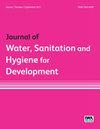可持续社区发展的综合行为改变干预:巴基斯坦古吉拉特地区讲卫生运动的KAP研究
IF 1.4
4区 环境科学与生态学
Q3 WATER RESOURCES
Journal of Water Sanitation and Hygiene for Development
Pub Date : 2022-10-19
DOI:10.2166/washdev.2022.243
引用次数: 1
摘要
行为改变干预措施对于通过确定新的做法和加强现有的积极做法来实现社区的可持续性至关重要。它被认为是寻求可持续未来的核心,并解决了多层面的社区问题,这些问题需要人类在健康、社交、体育活动和长期习惯方面的行为发生大规模转变。在此背景下,本研究通过探索水、环境卫生和个人卫生(WASH)的知识、态度和实践(KAP)的直接和中介影响,探讨了综合行为改变干预措施对可持续社区发展(SCD)的作用。通过分层随机抽样从Gujrat(巴基斯坦)地区收集主要数据,以探讨讲卫生运动的KAP影响及其与儿童健康(CH)和SCD的关系。该研究的假设用smartPLS软件进行了检验。该研究的总体样本结果表明,综合行为改变干预措施对KAP、日常生活中的讲卫生习惯、CH和SCD有重大影响。此外,变量之间的关系具有正显著性,对SCD具有直接和中介影响。本文章由计算机程序翻译,如有差异,请以英文原文为准。
Integrated behaviour change intervention for sustainable community development: a KAP study of WASH in district Gujrat, Pakistan
Behaviour change interventions are fundamental to achieve sustainability in communities through the identification of new practices and strengthening the existing positive practices. It is considered central to the quest for a sustainable future and solves multidimensional community problems, which require large-scale shifts in human behaviour with regard to their health, social, physical activities, and long-held habits. In this context, the study examines the role of integrated behaviour change interventions for sustainable community development (SCD) by exploring the direct and mediating impacts through knowledge, attitude, and practice (KAP) of water, sanitation, and hygiene (WASH). The primary data were collected from the district Gujrat (Pakistan) through stratified random sampling to explore the impacts of KAP of WASH and its relationship with child health (CH) and SCD. The hypotheses of the study were tested with smartPLS software. Findings of the overall sample of the study have revealed that integrated behaviour change interventions have significant impacts on KAP, WASH practices in daily life, CH, and SCD. Furthermore, the relationships among variables are positively significant and have direct and mediating impacts on SCD.
求助全文
通过发布文献求助,成功后即可免费获取论文全文。
去求助
来源期刊

Journal of Water Sanitation and Hygiene for Development
WATER RESOURCES-
CiteScore
3.10
自引率
11.80%
发文量
58
审稿时长
16 weeks
期刊介绍:
The Journal of Water, Sanitation and Hygiene for Development is a peer-reviewed journal devoted to the dissemination of high-quality information on the science, policy and practice of drinking-water supply, sanitation and hygiene at local, national and international levels.
 求助内容:
求助内容: 应助结果提醒方式:
应助结果提醒方式:


